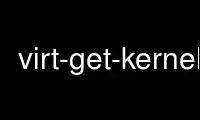
This is the command virt-get-kernel that can be run in the OnWorks free hosting provider using one of our multiple free online workstations such as Ubuntu Online, Fedora Online, Windows online emulator or MAC OS online emulator
PROGRAM:
NAME
virt-get-kernel - Extract kernel and ramdisk from guests
SYNOPSIS
virt-get-kernel [--options] -d domname
virt-get-kernel [--options] -a disk.img
DESCRIPTION
This option extracts the kernel and initramfs from a guest.
The format of the disk image is automatically detected unless you specify it by using the
--format option.
In the case where the guest contains multiple kernels, the one with the highest version
number is chosen. To extract arbitrary kernels from the disk image, see guestfish(1). To
extract the entire "/boot" directory of a guest, see virt-copy-out(1).
OPTIONS
--help
Display help.
-a file
--add file
Add file which should be a disk image from a virtual machine.
The format of the disk image is auto-detected. To override this and force a
particular format use the --format option.
-a URI
--add URI
Add a remote disk. The URI format is compatible with guestfish. See "ADDING REMOTE
STORAGE" in guestfish(1).
-c URI
--connect URI
If using libvirt, connect to the given URI. If omitted, then we connect to the
default libvirt hypervisor.
If you specify guest block devices directly (-a), then libvirt is not used at all.
-d guest
--domain guest
Add all the disks from the named libvirt guest. Domain UUIDs can be used instead of
names.
--format raw|qcow2|..
--format auto
The default for the -a option is to auto-detect the format of the disk image. Using
this forces the disk format for the -a option on the command line.
If you have untrusted raw-format guest disk images, you should use this option to
specify the disk format. This avoids a possible security problem with malicious
guests (CVE-2010-3851).
--machine-readable
This option is used to make the output more machine friendly when being parsed by
other programs. See "MACHINE READABLE OUTPUT" below.
-o directory
--output directory
This option specifies the output directory where kernel and initramfs from the guest
are written.
If not specified, the default output is the current directory.
--prefix prefix
This option specifies a prefix for the extracted files.
If a prefix is specified, then there will be a dash ("-") after the prefix and before
the rest of the file name; for example, a kernel in the guest like
"vmlinuz-3.19.0-20-generic" is saved as "mydistro-vmlinuz-3.19.0-20-generic" when the
prefix is "mydistro".
See also --unversioned-names.
-q
--quiet
Don't print ordinary progress messages.
--unversioned-names
This option affects the destination file name of extracted files.
If enabled, files will be saved locally just with the base name; for example, kernel
and ramdisk in the guest like "vmlinuz-3.19.0-20-generic" and
"initrd.img-3.19.0-20-generic" are saved respectively as "vmlinuz" and "initrd.img".
See also --prefix.
-v
--verbose
Enable verbose messages for debugging.
-V
--version
Display version number and exit.
-x Enable tracing of libguestfs API calls.
MACHINE READABLE OUTPUT
The --machine-readable option can be used to make the output more machine friendly, which
is useful when calling virt-get-kernel from other programs, GUIs etc.
Use the option on its own to query the capabilities of the virt-get-kernel binary.
Typical output looks like this:
$ virt-get-kernel --machine-readable
virt-get-kernel
A list of features is printed, one per line, and the program exits with status 0.
ENVIRONMENT VARIABLES
For other environment variables which affect all libguestfs programs, see "ENVIRONMENT
VARIABLES" in guestfs(3).
EXIT STATUS
This program returns 0 if successful, or non-zero if there was an error.
Use virt-get-kernel online using onworks.net services
